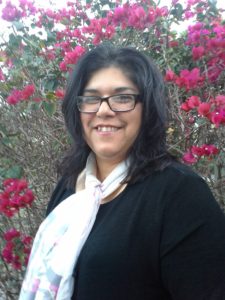 Alma Ovalle Perez is a wife and a mother to three wonderful teenagers. She is the daughter of Gilberto and Elizabeth Perez. Alma is a high school Spanish teacher, simultaneous interpreter and writer. She sits on the board of Mennonite Women USA representing Iglesia Menonita Hispana and is on the executive committee for Southeast Mennonite Conference of Mennonite Women USA. Alma lives in Sarasota, Florida.
Alma Ovalle Perez is a wife and a mother to three wonderful teenagers. She is the daughter of Gilberto and Elizabeth Perez. Alma is a high school Spanish teacher, simultaneous interpreter and writer. She sits on the board of Mennonite Women USA representing Iglesia Menonita Hispana and is on the executive committee for Southeast Mennonite Conference of Mennonite Women USA. Alma lives in Sarasota, Florida.
On a recent trip to the grocery store, I saw a woman who looked like she might be from the Middle East, wearing a white headscarf, and her three small children enter the store just ahead of me. Her two older boys looked about seven and four and the youngest, a baby girl, looked about a year old.
When I saw her, I remembered grocery shopping when I was a young mother with three young ones of my own.
We eventually ran into each other in one of the narrow grocery aisles, and we moved our shopping carts out of the way so we each could pass. We glanced at each other, lists in hand, and kept going. I lingered in the aisle looking for an item, but could hear the woman and her children as they moved over to a new row.
“Mommy, please! Can we take this?” begged one of the boys.
She answered firmly by saying, “No.”
As a young mother once myself, I could certainly appreciate her firm voice. I chuckled remembering how my oldest son had tried to convince me to buy something that he had wanted too, when he was little.
Soon enough, we ran into each other again. This time, the two boys were trying to negotiate with their mother about the health benefits of a certain item they wanted. This time, I heard her rationalize all the reasons the item was not healthy or good for them in broken English. I again remembered rationalizing with my kids. She looked nervously at me as I passed her by.
health benefits of a certain item they wanted. This time, I heard her rationalize all the reasons the item was not healthy or good for them in broken English. I again remembered rationalizing with my kids. She looked nervously at me as I passed her by.
As I turned the corner to another aisle, I could hear her exasperated tone speaking in another language to her children. I could only surmise that she was explaining why the boys couldn’t have whatever it was they were holding in their hands. As soon as she saw me, she started speaking English again.
And again, I couldn’t help remembering the countless times I had reverted to Spanish to get my point across sternly to my kids, as they tried to get their desired item before we got to the checkout line.
We eventually ended up in the cereal aisle. Now the boys were frantically asking for a cereal box with a toy in it. They went so far as to tell her the cereal with the toy in it was good for them and had many good ingredients. She looked at the box and said it was not good for them. For the next two minutes, they pleaded with her to take the cereal box with a toy inside.
She looked over at me with an exhausted look on her face and said to the boys, “Okay, just this time!”
I smiled and looked back at her and jokingly said, “They won this time, but maybe next time they won’t. My children are grown, and they don’t want to come with me to the grocery store anymore.” She smiled back at me and laughed a little, knowing I understood her.
We both went on to continue our shopping. But for a brief moment, the barriers of culture, ethnicity, and language fell away and we were women – she, a young mother of three in the motion stage raising young children, and I, a mother of three in the transition stage learning to let go.
Love in action for me that day was in the living of daily life. The grocery store provided the backdrop for giving another woman a reassuring word. And in the end, it was the gaining of common ground between two women from different backgrounds and different languages that meant the most to me.
In the goings of life we can give others the love that Jesus has given us and at the same time, gain an understanding of the humanity between us all.

Contribute to contribute a story for Love is a Verb contact Jenny.

